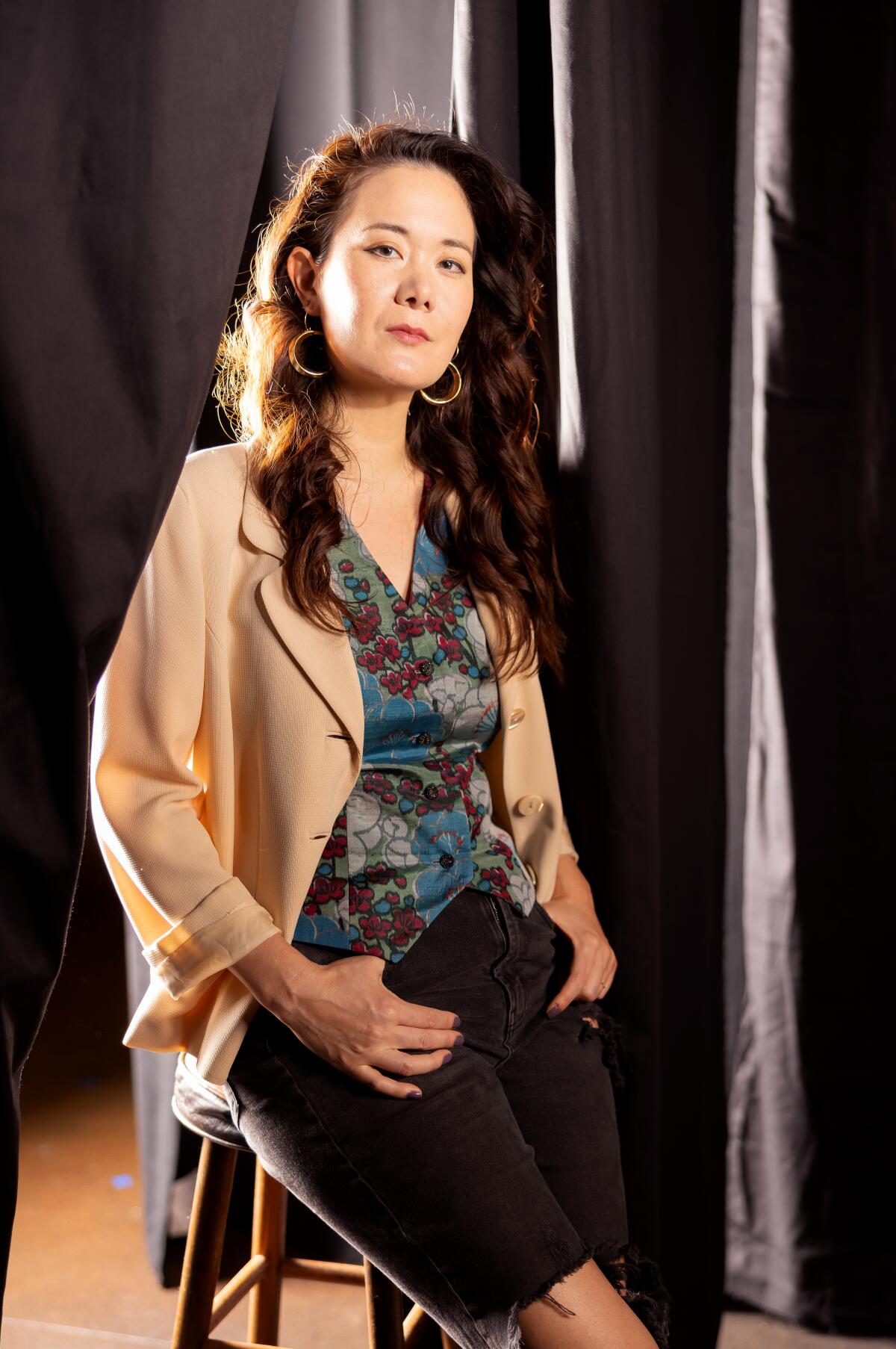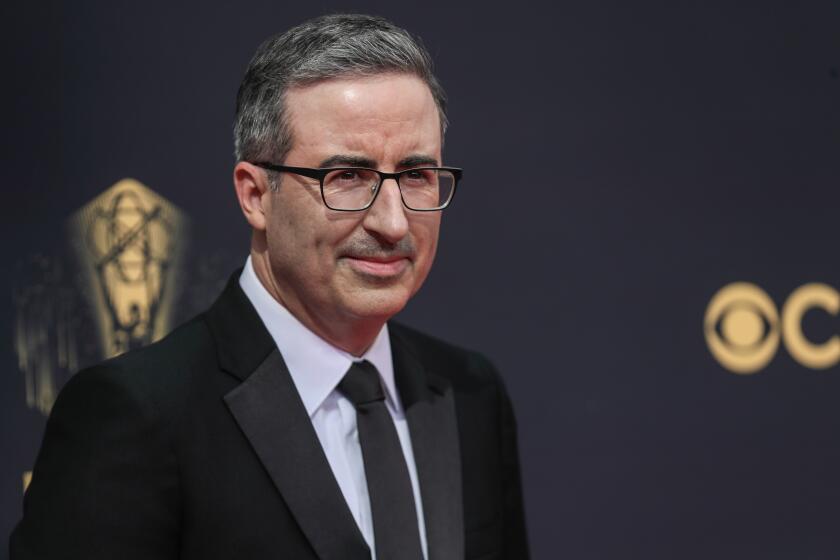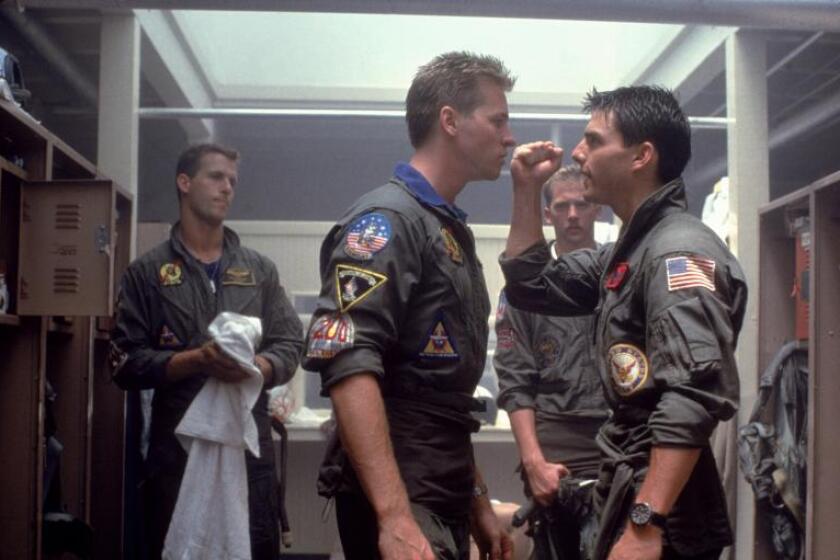Ashley Lee is a reporter at the Los Angeles Times, where she writes about theater, movies, television and the bustling intersection of the stage and the screen. She also co-writes the paper’s twice-weekly Essential Arts newsletter.
- Share via
1
“Is there a change in text that needs to happen?” asks Keiko Green, binder and pencil in hand. Rehearsals are underway for her new play “You Are Cordially Invited to the End of the World!” — particularly, the surreal moment in which Joel de la Fuente’s Greg, a father diagnosed with pancreatic cancer, meets Rafael Goldstein’s plastic green army man, who represents the military industrial complex and arranges the meeting at the behest of their mutual friend, Greta Thunberg.
It’s a complicated scene, acknowledges Green, who takes a seat at the prop table with director Zi Alikhan and the actors. She asks them about the characters’ motivations and their personal thoughts about the dialogue while scribbling in her script, incorporating their insights and addressing their uncertainties. She then suggests new lines to the actors who, after reading through them, share their feelings about the tweaks. This process — revelation, revision, run-through — repeats a few times until, finally, they all nod in satisfaction.
“I trust actors and I love them so much,” the Georgia-born, North Hollywood-based playwright later tells The Times. “I like to try things in the room, see what’s working for them and really lean into those things. And maybe because I’ve been an actor, we speak the same language and can build these characters together.”
Throughout the theater world, such collaborative, on-the-fly rewrites are as unique as Green’s plays themselves. “Exotic Deadly: Or the MSG Play” — which has played San Diego, San Francisco and, later this year, Seattle — centers on a time-traveling high schooler saving the world from the ingredient pervasive to Asian cuisine. “Empty Ride,” which debuted at the Old Globe earlier this year, follows a daughter who returns to Japan to drive her father’s taxi cab — and its supernatural passengers.
And “You Are Cordially Invited to the End of the World!,” which begins performances on Saturday at South Coast Repertory, is an ambitious exploration of grief, climate change and individual significance, whether one is still on Earth or otherwise. Ahead of the play’s world-premiere run — also starring River Gallo, Sharon Omi, Alysia Reiner and Anna LaMadrid — Green tells The Times about writing coming-of-age stage comedies for fast-talking actors, diverse audiences and, yes, children — but not for theaters’ boards of directors. This conversation has been edited for length and clarity.
This intimate spectacle was a hit in Asia for years, before the isolation of the pandemic and the existential threat of AI. The Times spoke with the cast and creative team about the musical’s unabashed originality and ambiguous ending.
What inspired this play?
My mother-in-law passed away right before the pandemic started. Everyone was really well-meaning, but the lockdown was a hard time for everybody, of course. It felt like my husband and I were in our own little ball of grief, in a way — physically, we were away from everybody, and also emotionally, people were just overwhelmed by a larger global grief. I asked my husband, “Do you feel like your grief was stolen from you, in a way?” and he said, “No. It feels really right that the world stopped when my mom died.”
That sentence was so clear and so moving, and I started thinking about theatricalizing the idea that one person can literally be your whole world. It became a play about significance: What does it mean to live a significant life? Can we make actions that are significant? Can we remember people and make them significant?

“I’m just gonna write what feels right to me,” says playwright Keiko Green.
(Christina House / Los Angeles Times)
“End of the World!” debuted at last year’s Pacific Playwrights Festival. What did you learn about it from that reading, and since then by workshopping it all over the country?
Theaters have been nervous about this play. People think that people don’t want to watch a play about dying or climate change, because both are depressing, so it was mostly a challenge to myself: Can I write a play about those things, but still make myself laugh while writing it? It has some big swings, and I didn’t know how it was going to land with people, but the response [at PPF] was overwhelmingly positive. People of all ages waited to talk to us afterward, some saying they connected with it because they had recently lost someone, but also, some saying, “I was diagnosed with a terminal illness, and it’s the first time I’ve seen a play about me that doesn’t feel like my life is already over.” That element was really cool.
I’ve been lucky to have tested it with so many audiences over the past year — after PPF, we’ve been to Texas, Connecticut, Pasadena, Oregon and New York City — and now we’ve come back to South Coast Rep, with three actors who’ve done the workshops. I think it’s that audiences don’t know what they want to see until it’s in front of them, and the moment we just give them what they think they want, we’re not doing our jobs anymore. The time is now to program things that get people saying, “Whoa, I’ve never seen anything like this before, and I had no idea I needed it in my life until now.”
Your recent plays have supernatural elements, time travel and interactions with other dimensions. Has your taste always been so fantastical and surreal?
I think so. I’d definitely say that, before the pandemic, I wrote what I thought theaters wanted: small cast, one location, one set, really accessible themes — you know, things that a theater’s board could really get behind. I was in my first year of grad school when COVID hit, and I was like, I’m just gonna write what feels right to me.
I wrote a total of nine plays in grad school, and the first one was “Exotic Deadly: Or the MSG Play,” with a million characters and sometimes changing locations three times on one page. It’s since done well — it got me into the O’Neill [National Playwrights Conference], got me my first TV writing gig, premiered at the Old Globe and is going into its third production this fall. That’s validating — like, it’s actually good to just write what you’re interested in, it does pay off to create the art you want to see.
You were a regional theater actor in Seattle for seven years. What pushed your pivot to writing?
As an actor, I always loved building the world of the play together with the director and writer and all the designers, and then once the play opened and they all left, I’d get so sad. I thought every actor also felt that way, and then I found out that most actors really love it when the director leaves and they’re on their own. That’s what made me first think, maybe I’m a playwright.
I’ve always loved new work, so I tried to do lots of workshops of new plays. I remember I was an actor reading stage directions for a “Cambodian Rock Band” workshop, and one day Lauren Yee brought in a draft with giant holes and [a note that read,] “There is some sort of fight here,” and then it’d just move on to the next scene. And then, another day, she came back with 40 new pages. I didn’t know you were allowed to do that! It was helpful to see how playwrights at the top of their game worked, which playwrights don’t usually get to see of other playwrights.

“Because I’ve been an actor, we speak the same language,” says Keiko Green.
(Christina House / Los Angeles Times)
How has your experience acting informed your playwriting?
Some theatermakers love actors who are like blank canvases, who can be whatever you want them to be. I remember, at [New York University], I learned about auditioning for soap operas — how to do your hair and makeup, what neckline you should wear — and it felt like a factory, dulling everyone’s sparkle and ridding people of anything that made them special. I feel like a lot of times, these training programs do that, and that’s why people out of school have so much trouble working at first, because they just have to find themselves again.
I prefer to be with actors who bring their personality and perspective, who aren’t afraid to be silly and also think fast and talk fast. I think because I love actors so much, I want to give them juicy parts that really showcase their talents, whether that’s with emotionally charged scenes so they can use those muscles, or by giving them a track with a bajillion characters so they can show off a humongous range. Even ensemble roles in my plays — those actors are never relaxing, they’re always doing quick changes or just turning into someone new.
You’ve written for Hulu’s “Interior Chinatown” and Apple TV+’s upcoming “Margo’s Got Money Troubles.” How has your TV writing impacted your theatermaking?
The “Interior Chinatown” writers room in particular was almost all Asian American writers, and they kept me real honest. Sometimes in the theater we [Asian American playwrights] had to be simplistic about how we tackle racial identity because we were fighting for a voice, but it felt like the only way you could get produced was to write identity plays or victimizing, trauma plays.
In that TV room, if I said something that felt like it would get a bunch of snaps in the theater, a writer would then say to me, “I think we can do better than that.” And I was like, “Oh, right, we have to do better, because we’re leading the charge.” It’s since influenced me on how I encounter Asian or Asian American characters in my own plays, and it’s the coolest thing to get to decide whether to incorporate identity into a play because of the play, not because I’m necessarily checking a box.
Among your many upcoming projects is “Be Like Water,” a children’s play about Bruce Lee that’ll debut at Seattle Children’s Theatre. What do you prioritize when creating a Theatre for Young Audiences production versus your other work?
I don’t come from an art family. My dad was a nuclear engineer and my mom worked as a translator and interpreter, and English is her second language. They don’t necessarily understand art. So I don’t enjoy theater that feels like it’s just for other artists, feels exclusionary or, in the worst case, just makes people feel stupid. And the truth is, theater is not dying, but it is slowing down; every performance is someone’s first play and an opportunity to either make them a theater lover or to push them away forever. That’s even more important with TYA shows.
This play isn’t even about the most physically exciting time in his life; it’s about when he was first moved to the U.S. and was discovering his philosophy of dealing with obstacles and learning that there’s a way through them versus battering at them. So I want to give them an idea of who this main character is — because they don’t necessarily know Bruce Lee by name — talk to them at their level, make it fun and theatrical, and speak to them as people who are figuring out who they are. And I love writing for people who are figuring out who they are, because that’s all of us.

“It does pay off to create the art you want to see,” says playwright Keiko Green.
(Christina House / Los Angeles Times)
'You Are Cordially Invited to the End of the World!'
Where: South Coast Repertory, 655 Town Center Drive, Costa Mesa
When: 7:30 p.m. Wednesdays-Thursdays, 8 p.m. Fridays, 2:30 and 8 p.m. Saturdays, 2 p.m. Sundays. Runs April 5 through May 3. (Check for exceptions.)
Tickets: $35-$114
Info: (714) 708-5555 or scr.org










